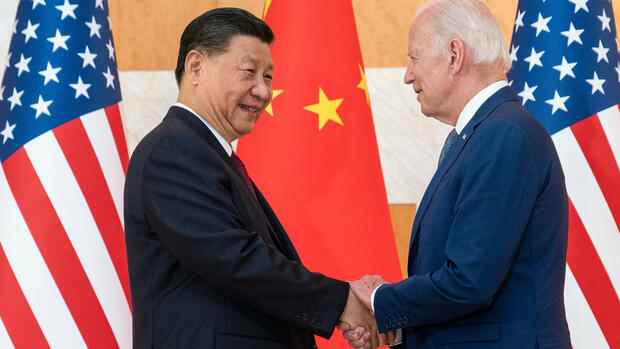The heads of state of China and the USA at the G20 summit in Bali.
(Photo: AP)
Bangkok Joe Biden is staying away from the meeting of the largest economic powerhouses in the Pacific region for personal reasons. Instead of consulting with leaders from countries like China, Australia, Japan, South Korea, Indonesia and Canada on how to combat the global downturn, the US President is taking time out for his granddaughter Naomi’s wedding.
Biden is handing the spotlight to his Chinese counterpart Xi Jinping at the Asia-Pacific Economic Cooperation (APEC) summit, which will follow the G20 meeting in Bangkok this Friday and Saturday.
At the meeting, Xi is expected to seek to further expand China’s economic influence in the region. Xi’s participation in the APEC summit underlines how important the People’s Republic takes economic cooperation in the region, the Foreign Ministry said in Beijing. In view of growing global instability and uncertainty, Xi wants to use the gathering to present China’s ideas for “promoting regional and global economic growth” in a keynote speech.
“An Unnecessary Mistake”
Political observers consider it a wrong decision for Biden to let Xi take the stage at the summit. “The President’s non-attendance is an unnecessary mistake,” commented Matthew Goodman, Asia expert at the US think tank Center for Strategic and International Studies. “I think he should have found a way to be present for at least a few hours to show the region that he cares.”
Top jobs of the day
Find the best jobs now and
be notified by email.
Biden would not have had to travel particularly far for this: The flight from the Indonesian holiday island of Bali, where the US President attended the G20 summit this week, to the Apec meeting in the Thai capital takes just four hours.
Biden’s rejection also caused astonishment because the USA itself will chair the organization next year and then host the APEC summit.
The US is sending Vice President Kamala Harris to the important meeting.
(Photo: IMAGO/NurPhoto)
Instead of Biden, Vice President Kamala Harris will now attend the meeting. She plans to make a public speech on the sidelines of the summit promoting America’s vision for the region.
Harris wanted to demonstrate that “there is no better partner for the economies and companies of the Indo-Pacific region than the United States,” officials said, according to US media. Among other things, she wants to focus on the US initiative “Indo-Pacific Economic Framework” (IPEF) launched at the beginning of the year.
The framework agreement is the Americans’ central attempt to strengthen economic ties with Asia. 13 countries, including Japan, Australia, Thailand, Malaysia and Vietnam, have joined the Biden initiative. Among other things, it aims to improve cooperation in technology supply chains and facilitate digital trade.
However, IPEF cannot offer its Indo-Pacific partners duty-free access to the US market. It is therefore expected that the economic benefits for the participating States will be limited.
China dominates Asia’s trade policy
China has dominated trade policy in the region since the United States pulled out of the Trans-Pacific Partnership (TPP) trade deal under former President Donald Trump. At the beginning of the year, the free trade agreement RCEP (Regional Comprehensive Economic Partnership) came into force, which includes China and the countries of the Southeast Asian state association ASEAN as well as Australia, New Zealand, Japan and South Korea. The bloc combines around a third of global economic output and is considered the largest free trade agreement in the world.
For the countries of Southeast Asia, China is by far the most important trading partner. In view of the growing tensions with the USA, the government in Beijing would like to further expand economic relations with its southern neighbors.
The Chinese Foreign Ministry announced in September that it was working on a “Version 3.0” of the trade agreement with the region. On the sidelines of the ASEAN summit in the Cambodian capital Phnom Penh at the weekend, China’s Prime Minister Li Keqiang confirmed his intention to strengthen cooperation with Southeast Asia in the areas of trade, industrialization and the digital economy.
Biden also attended the meeting in Phnom Penh. He also assured the ASEAN countries of closer cooperation. Relations between the alliance of states and the United States were officially elevated to a “comprehensive strategic partnership” and thus to the same diplomatic level that China already maintains with the region.
“Asean is at the heart of my administration’s Indo-Pacific strategy,” Biden promised. However, it wasn’t the diplomatic charm offensive that got the most attention, but a slip of the tongue: instead of Cambodia, the 79-year-old named a country on the other side of the globe as the host in his speech: Colombia.
More: Australia’s ex-PM warns of losing foreign investment in China
